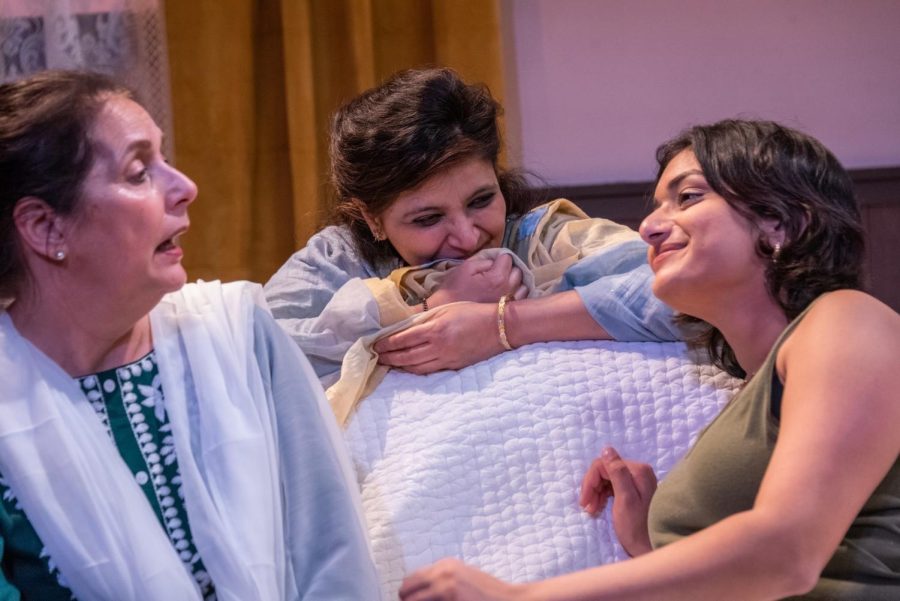Pakistani play ‘Jado Jehad’ opens doors to representation in theatre
Jyoti Daniere, Prreeti Tiwari, and Vidisha Agarwalla perform on the set of “Jaho Jehad.” “Jado Jehad” tells the story of a queer Pakistani woman, Mashal, returning home to live with her mother and grandmother after attending college in the United States. Photo courtesy Stratton McCrady Photography.
March 3, 2023
“It’s been a journey,” said Fatima A. Maan, an MFA student at Boston Playwrights’ Theatre, or BPT. Her play, “Jado Jehad,” premiered at the BPT from Feb. 16 to 26.
“Jado Jehad” tells the story of a queer Pakistani woman, Mashal, returning home to live with her mother and grandmother after attending college in the United States. Mashal navigates her sexuality while struggling with familial, religious and cultural expectations, all while adjusting to adult life. In Urdu, the title “Jado Jehad” means “to strive in opposition,” which perfectly describes the show’s themes.
Maan started her MFA at the BPT in 2020, and remembers being told that she was the first international student in the program.
“My fall semester of my workshop was with this Irish dude. [He] kept telling me that I needed to write my big American play that was for American audiences,” Maan said. “It was very much about what they wanted to see, what they came to the theater for.”
Maan also expressed that many audiences were confused due to the cultural relativity of the play. Many Americans did not understand why the grandmother was up at 4 a.m., but Maan explained that anybody who knows anything about the culture would know about morning prayers. However, despite the pushback and frustration over lack of progression, Maan persisted with her show.
Maan described how important it always was to have a “kickass South Asian cast” for the show, even halting production in order to find the right women for the roles. One such woman was Sushmita Udoshi, a junior at Boston University. She became involved with the “Jado Jehad” workshop over a year ago, but later auditioned when she saw a casting advertisement for the show.
“I haven’t really acted in a few years, but they posted that they needed some South Asian girls to read lines, and I was like, ‘well, that’s who I am,’” Udoshi said.
Despite acting from kindergarten through eighth grade, Udoshi had not performed until last year. She discussed the importance of the culture in the show, and how it had to be explained for American audiences, which she says was her greatest hurdle.
“[Representation] is incredibly important, so that other people that could potentially express themselves creatively know that they can see themselves in those spaces,” Udoshi said. “If I were to see representation of South Asians in theatre when I was a lot younger, I would have stepped into this space so much earlier.”
More playwrights, like Maan, are recognizing the importance of portraying certain universal experiences that all audiences can relate to, regardless of what culture they are from, allowing for more representation in theatre.
“It’s less about the culture and more about the experience,” Maan said. “Getting the experience as it is out there without trying to dictate what people should think or feel or know about it allows us to put up stories that really do matter or are able to resonate with other people.”
Lead actor Vidisha Agarwalla, a recent graduate of Northeastern, remembers her own experiences with racism in high school theatre. She became president of the New Renaissance Theatre club as an undergraduate, where she fostered a safe environment for people of color and minorities in the arts because she saw a complete lack of representation in theatre growing up.
“I felt relegated to the performing arts that our cultures deemed acceptable,” Agarwalla said. “There’s actually so much I can do, so much that I want to do. Sometimes you have to be the representation that you want to see.”
While the arts are becoming more inclusive, there is still so much room for growth, especially on the American stage. According to Maan, the American theatre industry is very academic, but it’s also an exciting place to deconstruct themes and subject matters in ways that would not be possible in other mediums. Throughout the play, Mashal and her family argue about moral and political debates. Despite the discomfort of Mashal with her grandmother’s generational and cultural barriers, the character has a happy ending when Mashal’s family accepts her girlfriend.
The show is somewhat autobiographical for Maan; however, the ending is entirely fantastical.
“I had to write this play for the part of myself who, as a Pakistani person, sort of craved that validation with that happy ending within my own setting, within my own family, within my own culture,” Maan said.
Similarly, Agarwalla described how audiences of multiple cultures and backgrounds have come to her in tears saying how moved they were by the play, and lamenting that they will never get the same happy ending.
“Homophobia exists across all cultures,” Agarwalla said. “It’s beautiful to be able to tell a story that resonates so deeply with me and who I am, and I wouldn’t have that if it weren’t for more representation, more diversity when it comes to all roles, on stage and off. There’s no point being an actor if you don’t have your stories being told.”
Thanks to creatives like Maan, more people are able to see parts of themselves in the media they consume, allowing them to feel seen, heard and understood. “Jado Jehad” hinges on the delicacy of familial relationships during times of personal discovery.
“I would love for audiences to call their moms,” Maan said.“[I hope] audiences’ ideas of race, ideas of color, ideas of age and sexual identity don’t matter, that people go see this play and are able to relate to anything they see on a person to person, human to human level.”






